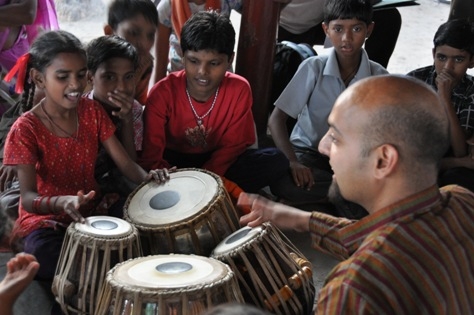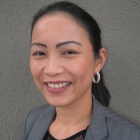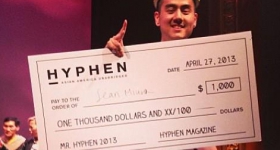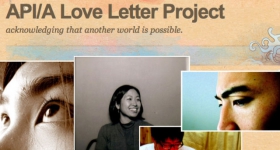Robin Sukhadia came to the United States with his family as an undocumented immigrant at age five. Since then, he’s become a Fulbright-winning scholar, an international pioneer and leader in making music education accessible for underprivileged youth, an accomplished tabla musician, and a director of not one, but various nonprofits.
But most precious to Hyphen among Sukhadia’s many achievements is the rich legacy he has left as our very first Mr. Hyphen winner.
The Mr. Hyphen contest launched in May 2006 with the goal of challenging stereotypes about Asian American men. We thought, ‘What if we put on a campy male pageant to bash Asian American male stereotypes while also having them raise money for nonprofits of their choice? Oh, and let’s throw in a men’s sleepwear and talent portion in addition to the interviews.’ Since its inception, Mr. Hyphen contest winners have included a quirky academic, a saxophone-playing drag queen, and a corporate marketing b-boy. But before they came along, Sukhadia had already set the standard high.
Sukhadia at first had big doubts about joining, especially since it was Hyphen’s first contest and no one knew what to expect. But Neela Banerjee, a Hyphen editor at the time and now Sukhadia’s wife, successfully persuaded and coached him throughout all contest preparations. Even today, eight years later, Sukhadia is incredulous over his win: “I came into the contest with the least number of fans. I had, like, two people holding up small placards for me, while the other contestants brought tons of friends holding huge posters. But as I kept coming back out [for different portions of the contest], more and more people kept cheering for me.”
When asked what nailed the win, Sukhadia cites the Q&A portion when he opened up about coming to the US as an undocumented immigrant, and the joyful moment he shared in his college years with his parents as they watched him swear in for his American citizenship. Sukhadia had the audience in tears. “Mr. Hyphen is not just a popularity contest so you really have to bring something genuine to say, not just talent. [Although] you can’t underestimate the preparation you need to do for the talent section.”
Did we mention that Sukhadia is a bad-to-the-bone tabla musician? The tabla is a percussion instrument used in much South Asian music, from classical music that accompanies folk and sufi poetry, to Bollywood. Originally, the instrument was played exclusively for emperors in court. But within the last 20 years, the tabla has burgeoned into a worldwide instrument.
Sukhadia's Fulbright research in India was partly focused on developing an innovative music program for a school for the Blind, in Gandhinagar India
Sukhadia first picked up the tabla during his college senior year semester abroad program in Delhi. Because very few tabla teachers exist, he was not able to continue learning until years later. But when he resumed at age 26, he ran with it, and has been learning the tabla with master tabla virtuoso Pandit Swapan Chaudhuri for over 11 years. Perhaps Sukhadia is most fascinating to interview when he excitedly describes the more technical aspects of playing: “There is no notation, it’s an oral tradition. Your teacher recite-sings a rhythm then you have to repeat it back [Does a demonstration by reciting syllables in varying rhythmic forms]. It’s totally like learning a new language, but I’ve found it good for the mind, it strengthens your mental awareness.”
For Sukhadia, the chance to play the tabla during the first Mr. Hyphen contest was also a means to come to terms with his ambivalence toward his culture in his younger years. “I [was able to] celebrate my Asian American-ness and I think that’s the whole point of Mr. Hyphen, to express that it’s cool to be Asian, that it’s actually awesome […] Most of my life I was ashamed to be Indian. I was the only Asian kid in my public school, it didn’t make me feel special…it made me feel like an outcast. I just wanted to fit in.”
Sukhadia’s parents and his two sisters crossed the Canadian border into Ohio when he was five years old. He grew up in a motel that his parents ran. Although his parents were set on the family becoming American citizens, they maintained traditional Hindu practices at home: “Going home was like stepping back into India, but then when I left the house I had to be part of American society […] it was challenging for me and my parents.”
These days, Sukhadia is pursuing his passion for music education. Among other nonprofits, he represents Project Ahimsa, an organization that provides learning opportunities to youth in underserved communities, as its international grant program director. Recently he lived in India for over one year on a Fulbright research scholarship to provide music education to children: “I taught music to street children in Kolkata and Ahmedabad and spent time with them in their homes in the slums of both cities. They possess so much talent and love for music, but get so little opportunity to study and express their musical gifts. Witnessing them learn and perform was tremendously inspiring.”

Teaching tabla street children in Ahmedabad, India
In India, Sukhadia focused on 16 children, who he later brought to the US to perform in 13 cities as EKATVA, which means “Oneness” in Hindi. They sold out Zellerbach Hall in Berkeley, CA. “These kids had never left the slums in India before or been on a plane. Yet they were able to share their talent and tell their stories to people here and really touch people’s lives in a deep way. For the children too, it expanded their concept of humanity and elevated their self-esteem, especially when they walked out on the Zellerbach stage and saw a full house cheering for them.”
What drives Sukhadia is his deeply-held belief “that humans are capable of much more. Not materialistically, but in terms of compassion and creativity. In a less primitive time than now, humans were more evolved in terms of their creativity and their connection to the planet and one another.”
And music is for him “a healing and spiritual process” that can inspire people toward doing more good. Among the perceptions of Asian Americans Sukhadia would like to change is that we are “not just doctors and lawyers and engineers. We Asian Americans are very artistic, compassionate and very creative. I’d like to see more examples of philanthropy in the South Asian community -- many Asians are wealthy as a demographic but I don’t see enough of that wealth being focused on supporting the arts.”
Indeed, perhaps Sukhadia’s greatest legacy from his reign as the first Mr. Hyphen is to set the standard for community involvement, and not just wear the title. Even today, he remains actively involved in the community, contributes to Hyphen via blogging and articles, and coaches Hyphen contestants. Hyphen is very proud to have Sukhadia as our first Mr. Hyphen winner, and we hope that future contestants will aspire to follow his fine example.
---
Hyphen is currently accepting applications for Mr. Hyphen contestants. The deadline to apply is February 15, 2014. The 8th Mr. Hyphen contest will take place on April 19, 2014 at the Marines’ Memorial Theatre at 609 Sutter Street, 2nd Floor, San Francisco, CA 94102.










Comments